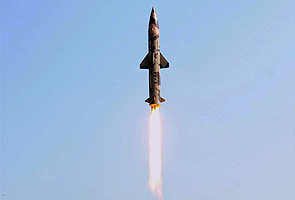
New Delhi, May 7: India has developed its own missile defence shield which can be put in place at short notice to protect at least two cities, bringing the country at par with an elite group of few nations. The shield, developed by the Defence Research and Development Organisation (DRDO), has been tested successfully and an incoming ballistic missile with the range of up to 2,000 kms can be destroyed.
"The Ballistic Missile Defence (BMD) shield is now mature. We are ready to put phase one in place and it can be put in very short time," DRDO chief V K Saraswat told PTI in an interview.
He said the shield, as part of phase one of the programme, can be put in place in two cities in the country, where the infrastructure is available. However, the two places have not yet been identified and the selection will be made at the political level. The DRDO used variants of Prithvi missiles as simulated targets and successfully intercepted missiles in test-firings.
The system was first test-fired in November 2006 elevating India into the elite club of countries to have successfully developed an Anti-ballistic missile system, after United States, Russia and Israel.
"We have carried out six successful launches and demonstrated the capability for 2,000 km targets. We have demonstrated it in two layers that is endo-atmospheric (inside the Earth's atmosphere) and exo-atmospheric (outside the Earth's atmosphere)," Mr Saraswat said.
The DRDO chief said the Indian missile defence system is comparable with the US Patriot 3 system, which was successfully used during the 1990 Gulf War against Iraq.
He said all the elements such as long-range radars and tracking devices, real-time datalink and mission control system required for the missile system have been "realised" successfully.
Under the phase two of the project, the premier defence research agency would upgrade the system to handle ballistic missiles with range of 5,000 km. This phase is expected to be ready by 2016.
The system required for phase-II of the project is being developed, he said, adding that for this purpose, ships are being built from where the target missiles would be launched.
Talking about the advancement of the system, he said the missile defence shield has been "automated" to an extent where human intervention would be required only if the mission has to be aborted.
As part of its efforts to protect itself from enemy missiles, India is developing this two-tier BMD which can intercept enemy missiles at altitudes of 80 km and 150 km.
The DRDO is thinking of intercepting the missiles at higher altitudes as it would give it more response time in case the first attempt is a miss and the second layer of the system can be put into action.





Comments
Add new comment